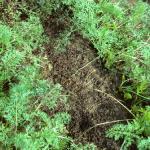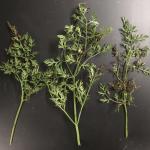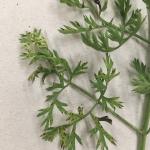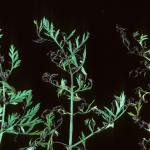Carrot, Alternaria Leaf Blight
Alternaria dauci
Alternaria radicina
Two species of Alternaria cause disease of carrots-A. dauci and A. radicina. A. dauci causes leaf spot and blight, is present in all carrot production areas of the world, and is capable of rapidly causing severe foliar epidemics. A. radicina causes damping-off and petiole and crown infection of seedlings, necrosis of roots and crowns, foliar blight, seed/umbel blight, and storage rot. Also present in all parts of the world where carrot are grown, A. radicina infects celery, celeriac, caraway, dill, fennel, parsley, and parsnips.
Identification:
Foliar symptoms of A. dauci first appear along leaflet margins as greenish-brown, water-soaked lesions which enlarge, turn brown to black, and often develop a yellow halo. Older leaves are more susceptible to infection. When about 40% of the leaf is infected, the leaf yellows, collapses, and dies. Petiole lesions are common, elongate, and can quickly kill entire leaves.
Life Cycle:
A. dauci occurs on the seed as spores and within the seed as dormant mycelium and/or spores; seedborne inoculum is important in the spread of this disease to new production areas. A. dauci is favored by moderate to warm conditions and prolonged periods of leaf wetness. The fungus survives in the soil on crop debris but dies when the residue decomposes. Initially, infection may occur on the petioles as shallow, black lesions which later spread into the crown and down the root. A. radicina is seed-borne and also survives in the soil both in association with plant residues and as free spores. It can persist in soil for up to 8 years.
Crop Injury:
Alternaria leaf blight leads to yield losses directly by reducing foliage and indirectly by causing carrots to be left in the ground during mechanical harvesting. A. radicina causes seed decay, damping-off, blackened hypocotyls, and deformed roots. A dry, mealy, black decay may develop when carrot roots are held in storage. Foliar symptoms caused by A. radicina are less severe than those caused by A. dauci; however, lesions on petioles can extend to the vascular system and cause yellowing, wilting, and plant death.
Cultural Controls & Prevention:
- Practice relatively long rotations of 3-4 years.
- Use certified pathogen-free seed or treat seed with hot water (50° C for 20 minutes) or fungicides.
- Prompt incorporation of carrot residues after harvest speeds decomposition of the crop debris that harbors the pathogen.
- To control Alternaria Rot in storage, carrots should be washed, culled, and stored at 0-1° C. Minimize wounding and breakage.
- Plant tolerant cultivars such as Waltham-Hi-Color, Orlando Gold, Hi-Color 9 (blight) and Improved Half Long Chantenay and K-2043 (Black Rot).
- Both Alternaria diseases are hard to target with fungicides once the crop canopy has closed. The first fungicide spray should be applied once 25% disease incidence is seen in the field. Subsequent chemical applications should be based upon disease severity and weather that favors disease development. Use of spray forecast models based upon the accumulation of disease severity values like Tom-Cast (for tomato Early Blight disease) is recommended.
Chemical Controls & Pesticides:
For Current information on disease recommendations ins specific crops including information on chemical control & pesticide management, please visit the New England Vegetable Management Guide website.
Crops that are affected by this disease:
The Center for Agriculture, Food and the Environment and UMass Extension are equal opportunity providers and employers, United States Department of Agriculture cooperating. Contact your local Extension office for information on disability accommodations. Contact the State Center Director’s Office if you have concerns related to discrimination, 413-545-4800 or see ag.umass.edu/civil-rights-information.



